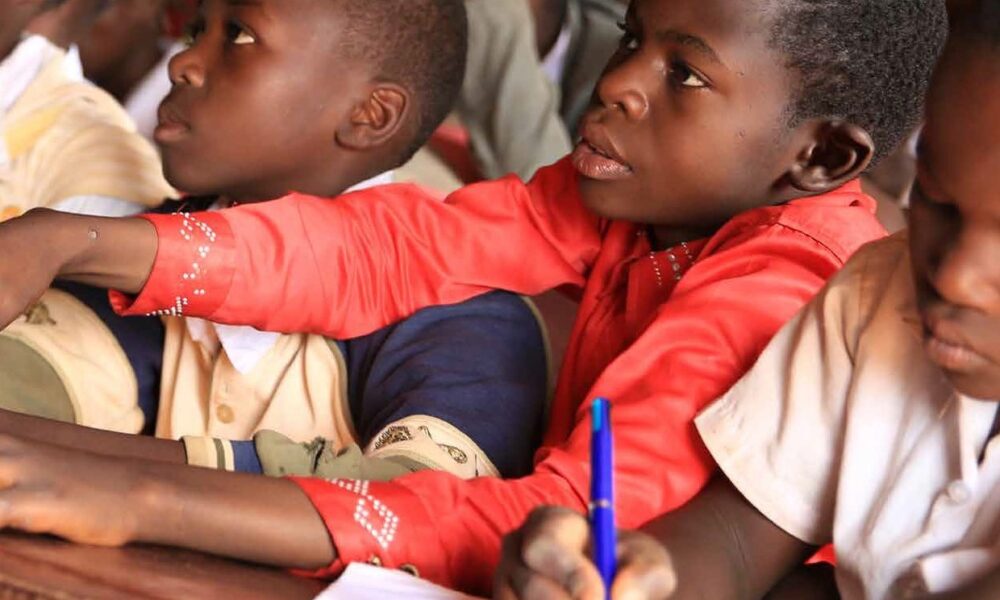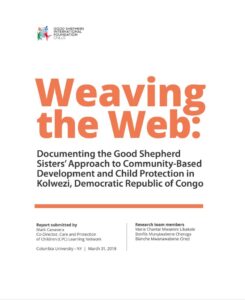
Radical Inclusivity in the DRC
Getting kids out of the mines
A model of “radical inclusivity” has been put into action to address household poverty and ensure child protection in artisanal mining communities in the Democratic Republic of the Congo.
Bon Pasteur (Good Shepherd) Kolwezi, the Good Shepherd Sisters’ operation based there, recruits children from the mine sites to attend a free school, built and staffed by Bon Pasteur and families in the community. The entire household is part of the program that was started in 2012, with a focus on skills training for adults in the family, especially women, as a means to increase income and reduce incentives for children to return to mining. The vocational training for family members includes an emphasis on farming, animal husbandry, crafts, hairdressing and sewing, skills that have mostly disappeared in the area due to an extended and pervasive reliance on mining incomes.
At the same time, as many as 2,000 children from the communities around the city of Kolwezi in the south of the Democratic Republic of the Congo (DRC) are going to school instead of working in the mines. Small-scale mining provides the raw materials, such as cobalt, needed for the electronic and automotive industries. Estimates show that over half of the world’s total supply of cobalt comes from the DRC and, according to the government’s own estimates, 20% of the cobalt currently exported comes from informal miners in the southern part of the country. Tens of thousands of children in DRC are involved in every stage of mining for cobalt. UNICEF estimates that overall 40,000 children are working in DRC mines.
But life for some of the child miners is changing due to the Good Shepherd Sisters, whose mission is to tackle children and women’s rights violations in the artisanal mining sector. To address these issues, the Sisters began a long-term effort of getting to know the community and obtaining the trust and acceptance of the locals. They developed a five-year plan to address the protection issues and economic deprivation of the communities, with special emphasis on women and children. The plan lasted from 2013 to 2017.
The Good Shepherd Sisters’ initiative to put the children of Kolwezi in school and help them and their families escape the grueling work in the mine, without insurance, safety or security measures, guaranteed income, or any other workers’ rights, is truly radically inclusive. As one observer put it, “There is no open door or closed door for the Good Shepherd Sisters; there is simply no door at all. And as one of the youths who studies with the Good Shepherd Sisters explained, ‘We have neighbors, and perhaps our neighbor’s child is mistreated. You come to the Good Shepherd Sisters and tell them about this mistreatment. You tell them in the office, and they go to help the family. Sometimes there are difficult cases. They help people outside of the program; it’s not only those of us who study that they help but they help others also.’” 
Indeed, this open, community-based model is a success. It eradicates child labor in mining communities. According to a 2018 report by the Care and Protection of Children (CPC) Learning Network at Columbia University in New York entitled Weaving the Web: Documenting the Good Shepherd Sisters’ Approach to Community-Based Development and Child Protection in Kolwezi, Democratic Republic of Congo: “the overall strategy [is] a winning one: rather than treating women’s protection and empowerment or child protection as isolated work strands, removed from the daily concerns of community life, the strategy situates women’s and children’s protection and empowerment in a broader poverty reduction and governance framework.”
The report continues: “At all stages, the focus on human dignity—on meeting people where they are, both geographically and emotionally—serves as the program’s touchstone. In a setting that is driven by a focus on the material, this focus on the spiritual in a meaningful, deep, and slowly built way has tremendous worth for the people of … Kolwezi.”
Going forward, this model can be used as an example to reach more children in programs that replicate the core features that have made the Bon Pasteur’s approach unique and successful.
This short video provides more information on the work of the Good Shepherd Sisters in Kolwezi:
Featured image: from the Good Shepherd International Foundation 2018 Annual Report.
Latest Posts By The Good Times
- 07.22.24Exercises to Boost Brain Health
- 07.11.24Canines Countering Cancer
- 07.02.24The Unsung Heroes of the War in Ukraine
- 06.21.24New Relief from Mosquito Bites
- 06.15.24Mina Guli


